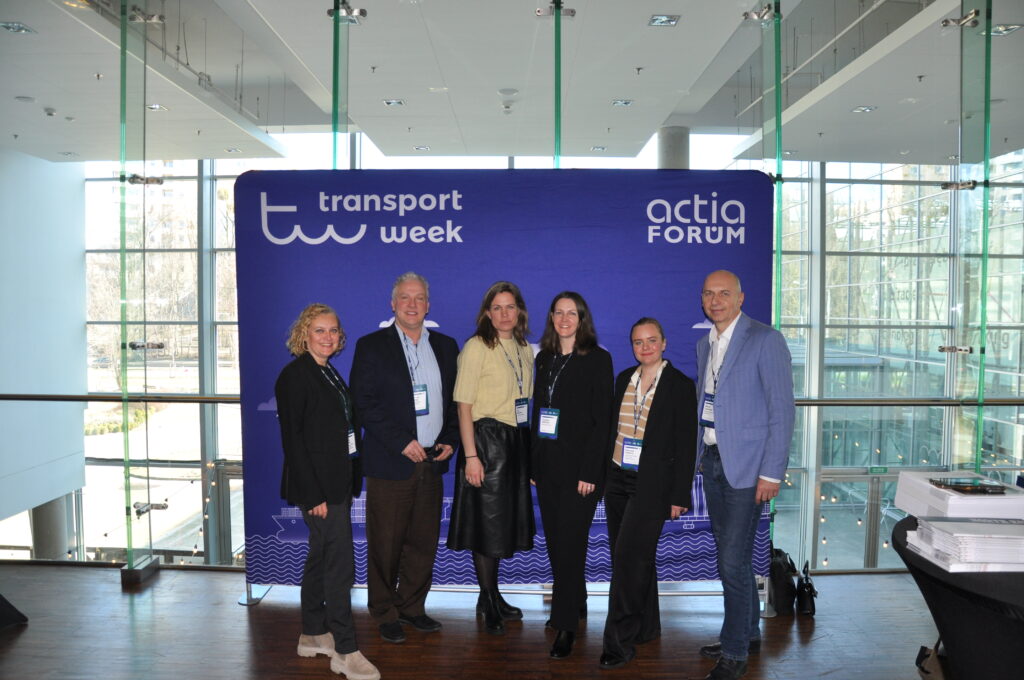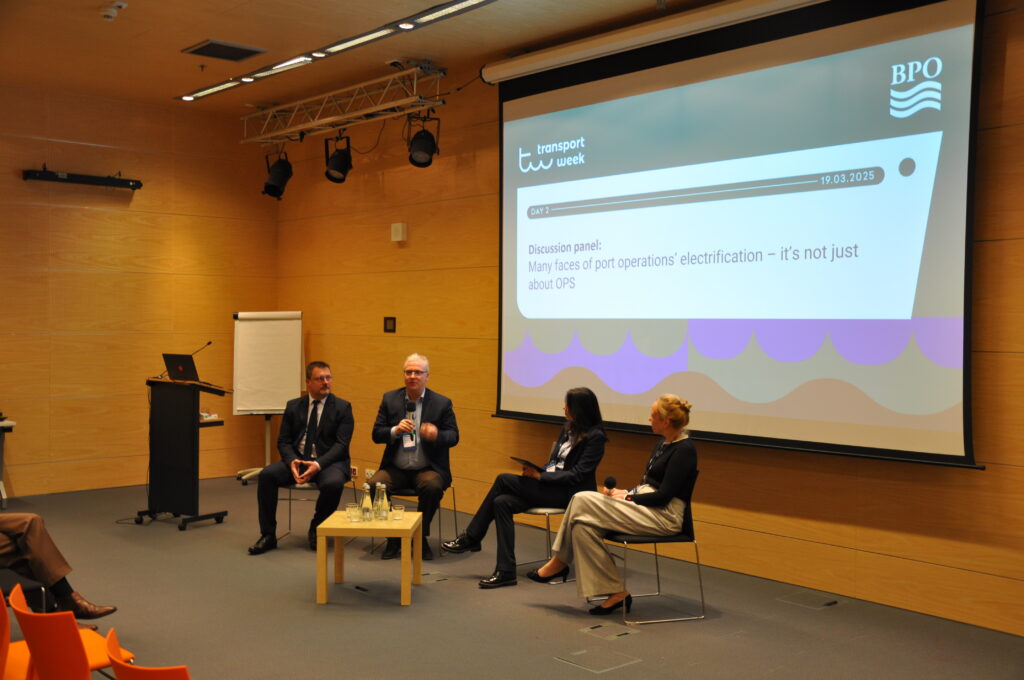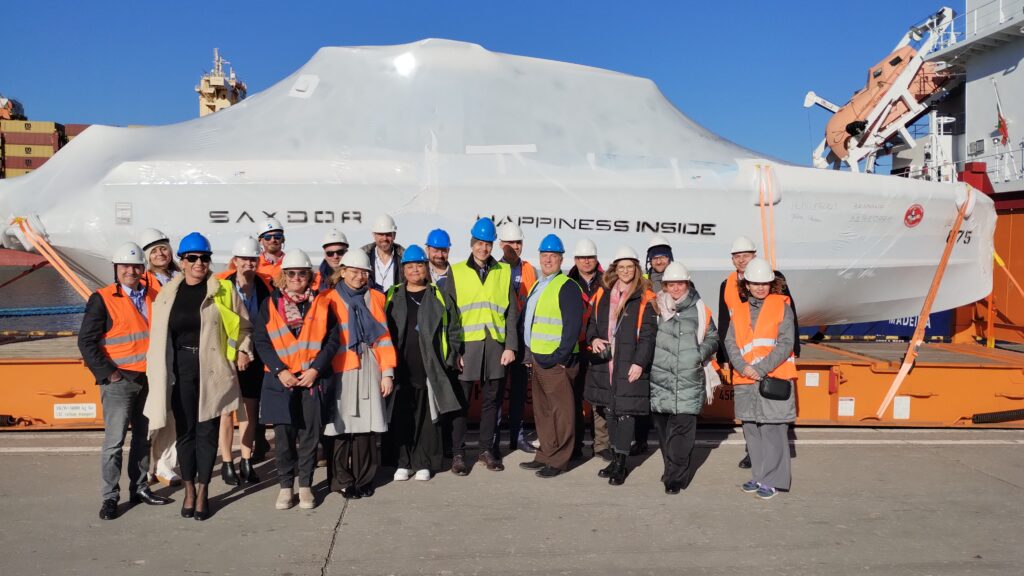The DigiTechPort2030 Conference Tour of 2025 was kicked off with the visit to the beautiful coastal city of Gdynia, Poland. On 18 March 2025 the project representatives entered the premises of Gdynia’s Pomeranian Science and Technology Park, as the Transport Week 2025 Conference welcomed its participants.
Aside from the main event programme, packed to the brim with presentations and discussion panels covering a wide plethora of topics, ranging from EU’s current position on the world stage, through port sector investment showcases to all-thing electrification in the maritime sector, the DigiTechPort2030 (DTP2030) crew, conscientious as usual, had some additional points to tackle on their bucket list.

Spreading the word
Naturally, the main conference programme itself could not do without a DTP2030 accent or two. Two of our representatives spoke during discussion panels on both days of the event, offering insights into the role electrification can play in decarbonising the maritime sector.
Andrius Sutnikas, speaking on behalf of the Klaipeda Science and Technology Park, joined the panel on “Cross-industry cooperation as the basis for the electrification of the supply chain”. He stressed the need for ports to focus more on how to balance securing the necessary energy supply and maintaining logistics. Future energy prices and infrastructure availability may pose a challenge in terms of ports’ competitiveness and the overall pace of progress of the port electrification process.
Lawrence Henesey, sporting the colors of the Blekinge Institute of Technology, shared his knowledge as part of the panel on “Many faces of port operations’ electrification – it’s not just about OPS.” The first and foremost question for small- and medium-sized ports is always whether they have the necessary funding to invest in green tech. The technology itself is there, usually pioneered by the biggest of players. Main industry actors have the money, the know-how and, not to forget, the staff, to implement green technologies quickly and efficiently. With a little bit of luck and a great deal of hard work (this part we’ve got covered), the DTP2030 project will be able to show how the experience, knowledge and tools at the disposal of the industry leading companies can be scaled down and tailored to the needs and capabilities of their smaller counterparts.

A tale of three projects
For us, the spirit of cooperation, of benefiting from each other’s knowledge and experience, lies at the heart of the EU funding programmes. Many of the projects deal with various aspects of similar, overarching issues, one of them being decarbonisation. Seizing the opportunity presenting itself during the Transport Week in Gdynia, the DTP2030 project invited two other EU-funded initiatives – the Blue Supply Chains project and the DeCoInter project – to a joint meeting, hopefully serving as the steppingstone for further cooperation between the three partner consortiums.
All three of the projects had the chance to hold three brief presentations, showcasing their core planned outcomes and activities. There is a lot of synergy that can be tapped into, and the gathered participants were eager to see just how much we can accomplish when working together.
Into the maze
As with any proper first date, the meeting of the three projects had to involve some sort of exciting activity to tell your friends about. In our case, the excitement was provided by our colleagues at the Gdynia Container Terminal (GCT), one of the Blue Supply Chains partners.
The GCT crew was kind enough to invite us for a study visit, showing off their yards in the midst of action (as if action ever stops on a container terminal!). We boarded a bus and were then thrust into the maze of stacked “boxes”, as containers are often referred to by the industry professionals, accompanied by the soothing voice of our guide, Mikołaj Magiełka, GCT’s Commercial Manager.

While not one of the biggest container terminals out there, it is definitely among the busier ones – it was a great experience to witness how Mikołaj and his colleagues approach the challenges posed by limited space and maximize their operational efficiency by utilizing every possible inch of yard capacity at their disposal.
Operational optimization is not the only thing the GCT crew cares deeply about. They also take the issue of environmental responsibility very seriously. As part of the Blue Supply Chains project, they plan to further the retrofitting process of their RTG cranes, switching to electric power.
During the Transport Week conference, Mikołaj also spoke about GCT’s current plans, including the dismantling of the 500 kW diesel engines with power generator, installation of 15/0.4 kV transformers along with 15 kV power cables on cable reels, equipment of the cranes with 90kW diesel auxiliary generators for use in emergency situations, and reducing the annual diesel consumption to 20,000 instead of the 420,000 liters, as well as decreasing the CO2 emissions by approx. 1 mln kg per year.
The BSC project would like to thank the Transport Week organizers and all of the project partners we had the chance to talk shop with during these past few days. The year has just started but it is already looking very promising!